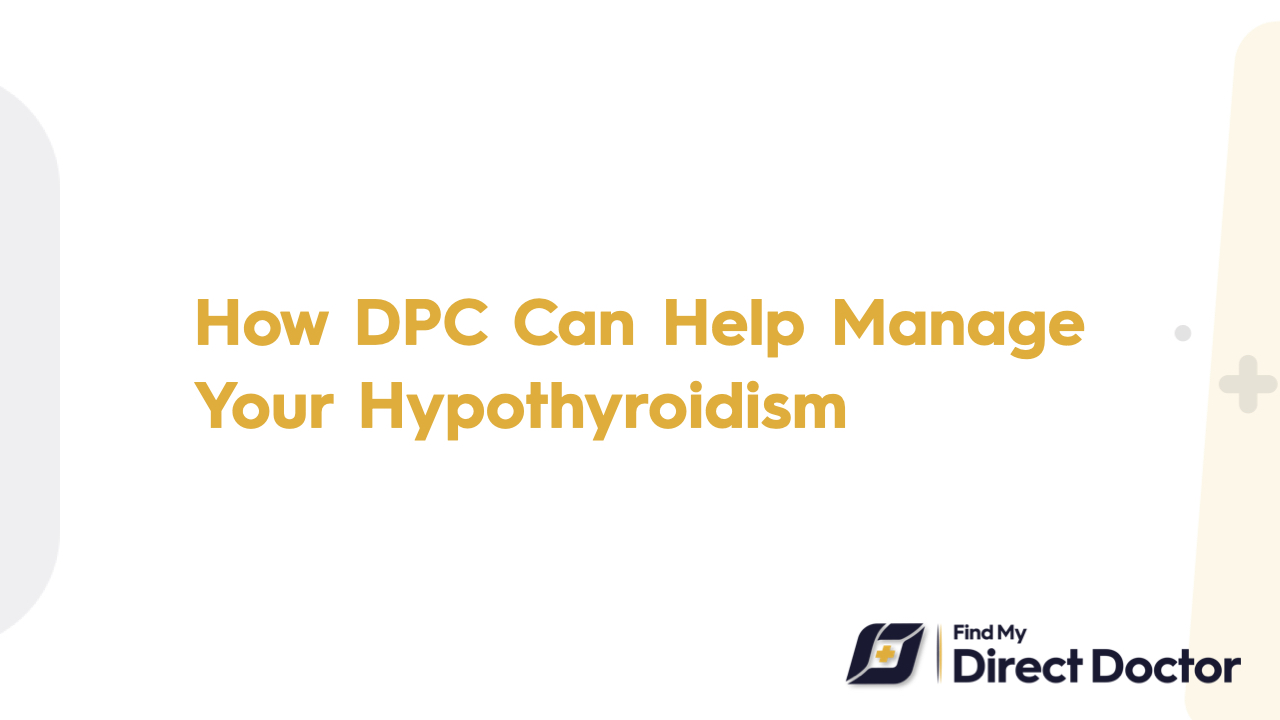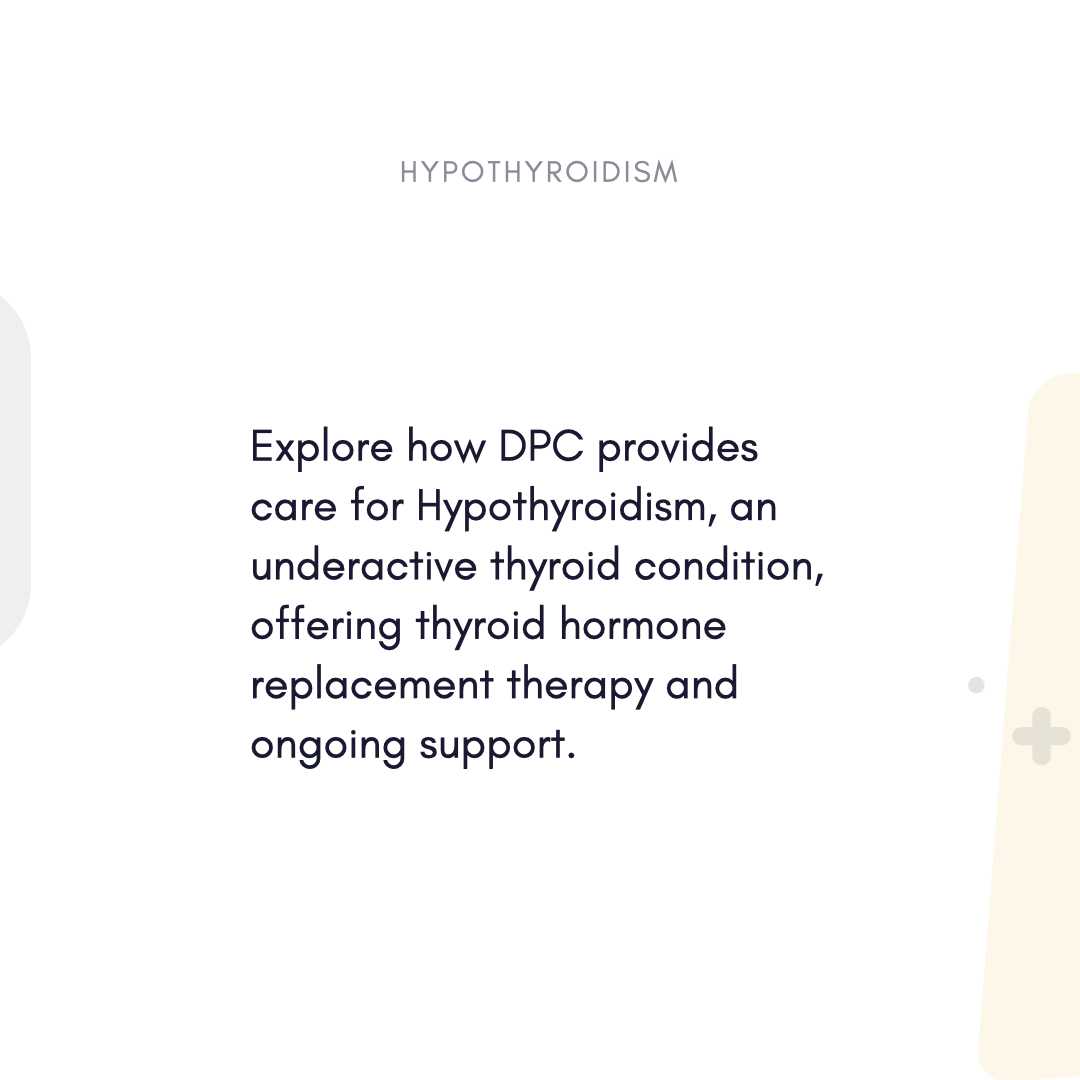Hypothyroidism and Direct Primary Care (DPC): Your Path to Personalized, Lifelong Wellness
Among the 5% of Americans living with hypothyroidism—a disorder in which the thyroid gland underproduces hormones vital for metabolism, energy, and mood—you may be battling inexplicable tiredness, weight gain, or brain fog. Ignored, it can cause heart disease, infertility, and extreme depression. Conventional medicine sometimes treats management as sporadic lab tests and one-size-fits-all prescriptions, so trapping patients in a cycle of unresolved problems. Offering affordable, patient-centered care that finds underlying causes, optimizes treatment, and enables you to flourish, Direct Primary Care (DPC) provides a better path. Let's investigate how.

Knowing Hypothyroidism
When the thyroid gland produces insufficient T4/T3, a condition known as hypothyroidism results, so slowing body processes. Typical factors include:
- Thyroiditis from Hashimoto's disease: Most often occurring cause is autoimmune thyroid destruction.
- Iodine shortage or hyperthyroidism surgical/radiation treatment.
- Pituitary conditions: Influencing TSH generation.
Symptoms include cold intolerance, dry skin, depression, weight increase, and memory problems.
Risks include heart disease, myxedema—severe, life-threatening hypothyroidism—and raised cholesterol.
Restoring quality of life depends critically on early diagnosis and accurate hormone replacement.
How DPC Changes Hypothyroidism Management
Under the membership approach known as Direct Primary Care (DPC), patients pay a monthly fee—usually USD 50–USD 150—for unlimited access to their doctor. This means for those with hypothyroidism no hurried visits, no surprise bills, and treatment catered to your particular biology and way of life.
Individualized Attention Anchored in Expertise
Using American Thyroid Association (ATA) recommendations, DPC doctors provide:
- Precise diagnosis: Complete thyroid panels (TSH, free T4, free T3, TPO antibodies) to find pituitary or Hashimoto's disease.
- Customized therapy schedules:
- Optimisation of medications: Changing levothyroxine dosages in response to symptoms and lab findings; add T3 (liothyronine) as necessary.
- Lifestyle choices: Dietary modifications (e.g., foods high in selenium), stress management, or filling in nutrient deficits (iron, vitamin D).
- Emphasis on comorbidity: Managing cholesterol, heart health, or fertility issues connected to hypothyroidism.
- Frequent TSH and free T4 testing help to guarantee ideal hormone levels.
Cost-Effective, Transparent Treatment
Wholesale-priced drugs help DPC clinics lower costs:
- Generic levothyroxine as low as USD 4 a month.
- Discounted labs: Full thyroid panels and antibody tests at cost.
- Using proactive monitoring helps to avoid ER visits for myxedema.
Comprehensive Support for Lifelong Wellness
Having 24/7 access to your doctor allows you to:
- Quickly change dosages should symptoms flare—that is, hair loss or extreme tiredness.
- Track development using symptom notebooks or apps.
- Deal with underlying causes: Testing for Hashimoto's triggers—such as chronic stress or gluten sensitivity.
DPC Customized Hypothyroidism Management
DPC's approach delivers accuracy in line with ATA recommendations:
- Fine-tune T4/T3 ratios until you feel your best, not only normalize lab values.
- Autoimmune control: Lowering Hashimoto's flares by anti-inflammatory diets or stress management.
- Teaching patients: Medication adherence, possible drug interactions (such as calcium supplements), and lifestyle changes for optimal results.
- Continuous monitoring: Adjust dosage during pregnancy, menopause, or weight changes.
Real-Life Success Stories
- Case 1: Sarah, 38, suffered with "normal" TSH levels but extreme tiredness. Her DPC doctor added liothyronine, diagnosed Hashimoto's, tested free T3 and TPO antibodies. Her energy and concentration came back six weeks later.
- Case 2: James, 55, dropped 30 pounds even on levothyroxine. His DPC doctor found gluten intolerance and extreme vitamin D deficiency. James dropped 25 pounds and rebuilt energy with supplements, dietary changes, and a dosage adjustment.
Frequently Asked Questions: DPC and Hypothyroidism
- Q: Can DPC control thyroiditis related to Hashimoto's disease?
A: Sure. DPC emphasizes using diet, stress management, and ideal hormone replacement to lower autoimmune flares.
- Q: For lifetime thyroid treatment, is DPC reasonably priced?
A: Indeed! Most save on labs, drugs, and specialist co-pays. Often, memberships are less than a gym subscription.
- Q: Suppose I need an endocrinologist?
A: Your DPC doctor guarantees specialists have your complete medical history and coordinates referrals.
Why DPC Helps Hypothyroidism Patients Win
DPC improves thyroid management by:
- Prompt corrections: Same-day access to alter dosages during symptom flares.
- Affordable labs and drugs free of hidden costs—cost transparency.
- One provider who notes your development and modifies treatment as your life changes.
- Education: Explicit instructions on diet, supplements, and lifestyle to maximize treatment effectiveness.
Take Charge of Your Thyroid Right Now
Hypothyroidism does not have to mean a lifetime of frustration and tiredness. With DPC, you will find a partner who helps you balance hormones, recover energy, and flourish by combining modern testing with compassionate support.
- Direct Primary Care gives you:
- Precision treatment catered to your biology.
- 24-hour access to address weight plateaus or brain fog.
- Financial clarity helps to stay consistent and lower anxiety.






